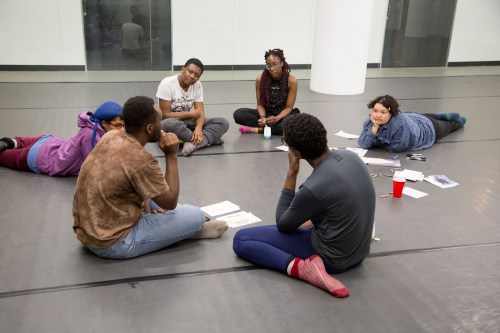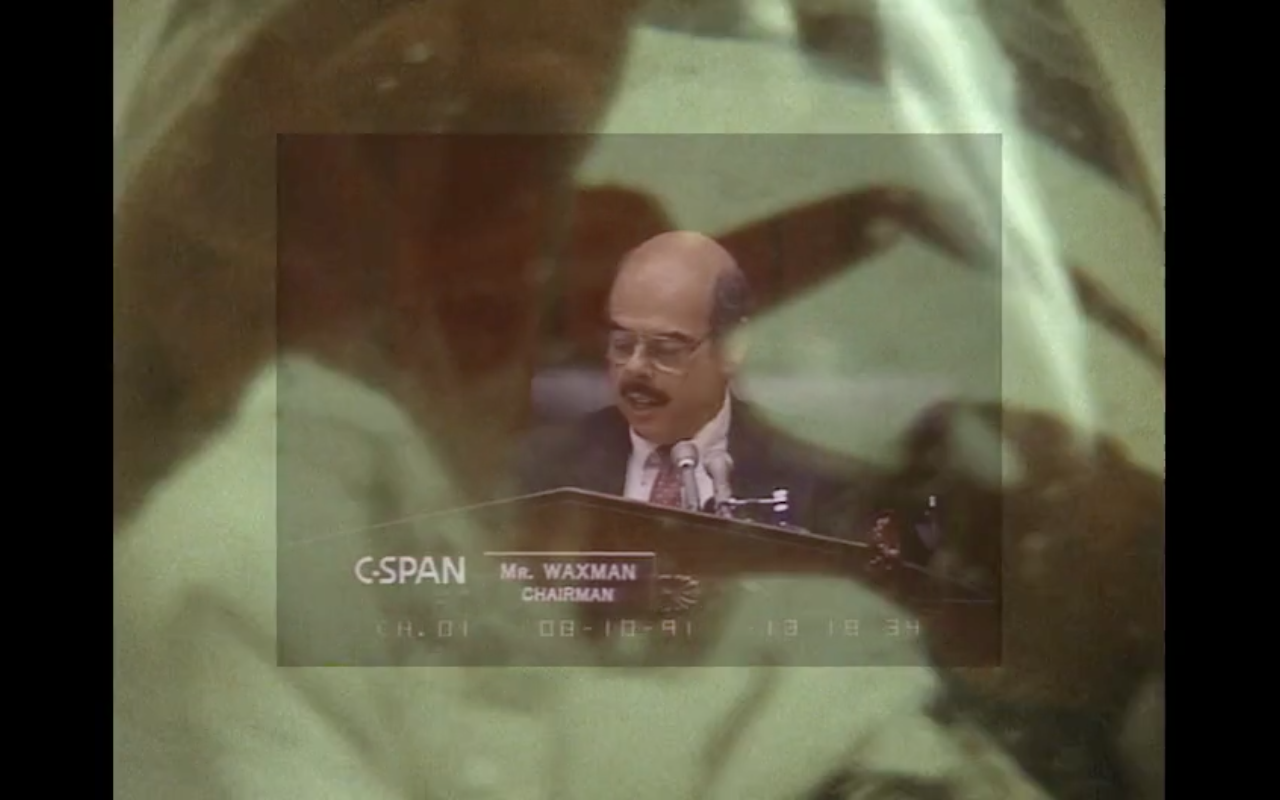Movement Matters is a monthly column by Michael Workman that investigates performers whose work intersects politics, policy, and issues related to the body as the locus of socio-cultural dialogues on race, gender, ability and more.
For this installment, we sit down with dancer and performer A.J. McClenon to discuss the influence of water and the transatlantic slave trade on her art-making, on writing and anxiety in her family and her personal life, and the validating urge to understand the lives of others. An edited transcript of the interview is presented here.

Michael Workman: Finally! You and I’ve been trying to sit down together for 6 months. Wonderful. So, as we usually start here, do you hail from Chicago, or relocate here from elsewhere?
A.J. McClenon: I’m originally from D.C. I moved here in 2012 for the grad program in creative writing and video at [School of the Art Institute of Chicago (SAIC)]. I went to the University of Maryland – College Park for undergrad and I first started off doing sculpture. And then as time passed on, I really wanted to make a short film. So I was doing independent studies with Jefferson Pinder and he suggested I do animation, stop motion animation, and I got into video from there.
MW: So when did the performative element come in?
AJM: It wasn’t really part of it then, I would sometimes do video performance, I did a stop motion animation, with myself, and made movement with that. but then I think as I started reading poetry more and bringing in performative elements, I was bringing together a lot of different kinds of materials.
MW: You were finding your own style. Sounds like it was a mashup between poetry, video, and whatever other things.
AJM: Yeah. I think with video I started from a narrative, kind of like dreamy sequences and things like that, and then I wanted to push myself to actually read in front of people things that I wrote — this was in Chicago — but in Maryland, I was in a residency at the Jimenez Writing House and did a lot of writing. I pushed myself to read more of what I wrote and then include the sound from the video, and then this straight sound would be included in the performance.
MW: Was it something that you were inspired by out of your own history? Family history — that kind of thing?
AJM: I was always really interested in music. My mother was a teaching assistant. I grew up with my mom and my grandparents. My grandfather liked music a lot, so I grew up listening to music he was into, like old jazz and things like that. Actually, my aunt, who is 18 years older than me, started getting involved in the theater, and she move to New York in 1992 and I would go with her in the summers. I would go backstage with her when I was little, I think she started it. Small productions that she would be in and things like that. My Mom used to be a part of a dance troupe called Chocolate Express in Washington, D.C. They opened for the band, the Manhattans, back in the late ’70s, I believe. And so she’s always encouraged me to dance more despite me being shy about it. Also, her sister, my other aunt, is an amazingly talented baker and cook which I think is an artistry in itself.
MW: So how much did she contribute to what the work was about, then?
AJM: When I was in D.C., I suffered from a lot of anxiety and agoraphobia, then I went to Maryland and I stayed a lot inside my house. And so I would write from that, and going to group therapy to try and figure out where that’s at was pretty much my teenage years, so I think a lot of my time since then I’ve talked a lot about adolescence, and I’m now kind of focusing on what it specifically feels like to be having a panic attack or to be drowning — but also what does that mean for a black person, specifically? So I think digging in a lot of therapy, a lot of that stuff comes up, why I’m having this panic attack and thinking a lot about the water, I grew up around water and spent a lot of time fishing with my mom, her boyfriend and his kid.
MW: Yes. In part of what I saw in the piece you performed at Comfort Station, the Black Water project — which I think of as a sort of umbrella project — it was very evocative and recalled the black folks that were drowned when they were sometimes thrown off slave ships.
AJM: Yeah, mm-hm. So my family wasn’t a family of artists, but my grandmother had a lot of anxiety and you can imagine growing up around that as a kid, I was picking up on that. And so just connecting that with this notion of fishing, and of hunting –I would spend a lot of time out on the Chesapeake Bay and fish there, and then as I got older, and understood gender and what that means, all these different relationships were happening. I would be by the water in D.C., and then spending time at the theater in New York — it came about integrating all those different parts.

MW: So it seems like you were constantly dealing with the sense of dislocation. Not just geographically but also in terms of gender identity, all this little stuff that’s culturally fracturing — do you feel as though those elements are always present in the work you’re making?
AJM: Yes, definitely. Black Water started out when I moved here, I was just breaking through in my writing, and challenging myself, and so when I got into SAIC, I just thought, “Okay, I’m just going to go for it.” And then my mom’s boyfriend passed away so I started thinking about water more and writing about it, did a lot of video work on water, and researched the transatlantic slave trade, thinking about epigenetics and how memory is transmitted through DNA, and what that means in relationship to water. There was a lot of stuff coming out about how trauma is hereditary end can be passed down, and actually change your DNA. So, if your father went through a traumatic experience, that could then be a part of your DNA. I was thinking about this a lot in the work, as well as telling stories about my teenage years, and then I got curious about other people’s stories and wanted to get out of my own head.
So, this past fall I started the program at High Concept Labs, where I was laboratory resident. That was about wanting to listen to other people’s stories and not make it all about myself, but to tell other people’s stories and especially those who identify as a part of the African diaspora. And so I started interviewing people, and then I started talking to people. We would meet up and talk about our experiences around water. Then we started pulling memories from some of the questions I was asking, and I was having these physical responses to the memories, so we started pairing up and responding to each other’s physical responses.
MW: So what’s the ultimate outcome of Black Water as a project for you, then?
AJM: Well, ultimately, I call them Black Water: Polarities. I’m thinking about the properties of water, how it’s charged with polar outcomes, and thinking about that in terms of movement, too.
MW: Thanks, AJ, it’s a fast-moving project and I’m looking forward to seeing how it all resolves.
Upcoming appearances for McClenon include the Eclipsing Festival Day 2 at Links Hall, Friday, Feb. 2, 2018, 7 p.m. and a performance at the In/Motion International Dance Film Festival Saturday, March 24, 2018, 2-4 p.m., taking place at the Loyola University Lakeshore Campus, Mundelein Center for the Arts, in Room 409. For more information, visit ajmcclenon.com.
Please send questions, comments or tips to Michael Workman at michael.workman1@gmail.com. Each Spring and Fall, as a corollary to the Movement Matters column, we also present a series of symposia and performances at different locations throughout the city based on topics developed out of and indexed from both the columns and live discussions.
